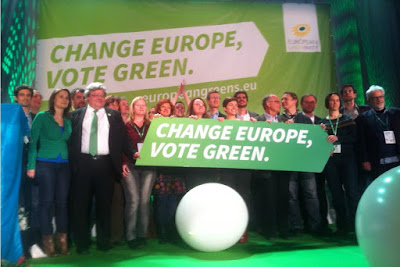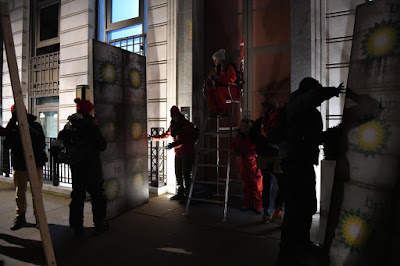Written by Allan Todd
“BP has been lying to the world about the climate crisis… and Bernard Looney (their new CEO) has been working for BP the whole time. They’re out of time, we’re out of patience - and they need to get out of the oil and gas business entirely!”
One of the Greenpeace activists involved in the action against BP’s London HQ, Weds. 5 Feb. 2020.
In the (VERY!!) early hours of Wednesday 5 February, I was one of over 100 Greenpeace activists who turned up outside BP’s London HQ in St. James Square. The aim was to send a clear message to their new CEO, Bernard Looney, who was due to start work that day.
He claims he ‘gets it’ as to why so many climate activists are frustrated about the on-going ‘dirty energy’ projects of fossil fuel companies such as BP; and has said he will soon be setting out his low carbon ambition for the company.
But BP - and all the other dirty energy companies - clearly STILL don’t get that, as has Bill McKibben pointed out, we can either have dirty energy companies with healthy balance sheets; OR we can have a relatively healthy planet. But we can’t have both! So we need to do all we can to get the message across that AT LEAST 80% of all fossil fuel reserves need to stay where they are - in the ground.
“Since I wrote one of the first books for a general audience about global warming way back in 1989,…, I can say with some confidence that we’re losing the fight, badly and quickly - losing it because, most of all, we remain in denial about the peril that human civilisation is in.”
Bill McKibben, Global Warming’s Terrifying New Math, Rolling Stone, 2012.
The visit
Thus, in an attempt to help end that “denial about the peril” referred to by Bill McKibben, Greenpeace decided to give BP a ‘wake-up!’ call. Despite an unusually rapid - and initially very heavy-handed - police response, we were able to achieve our main objective: to shut down the entire BP office, so that Mr. Looney would be unable to get into his office on his first day as BP’s new CEO.
This was achieved by 24 Greenpeace activists blocking all 6 doors into the building, using two main methods.
Firstly, getting one activist locked-on to a ‘lifeguards’ chair right in front of each of the doors. In order to make removal of these protesters difficult for the police, the chairs were 2m 20cms high. Ordinary police officers are not allowed to attempt to remove protesters from any structure which is more that 2m high! Instead, they have to await the arrival of the specialist Protester Removal Unit.
The other method was then manoeuvring heavy oil barrels in front of each door, and getting 3 other activists locked-on to each one:
One of the 6 groups of 4 which successfully blocked their allocated door.
Internationalism in practice.
Many of the activists involved in this action came from other European Greenpeace groups - to help underline the fact that the Climate Emergency is a global issue: in part, because companies such as BP operate right across the world. My team ‘buddy’ was a young woman from France.
The team we were in was given the task of blocking the main entrance - although we were successful in that, as were the other teams, the aggressive policing prevented us from achieving our additional goals. One of which was to placing hoardings around 2 sides of the building:
The hoardings which, in the end, we were not able to get into position
(my back is to the photographer, as my ‘buddy’ & I place the panel on the L.)
Solar panel ‘tents
The other additional task was to fill 2 of the streets with 250 used solar panel ‘tents’, under which the remaining activists would sit and attach themselves - thus effectively blocking those streets for the duration of the protest:
Police quickly removing the solar panel ‘tents
(I’m under the panel on the L.)
After having dived under - and been forcibly removed from! - 4 of these quickly-erected ‘tents’, at around 3.30am my buddy and I joined 50 or so other activists to lay down in Charles II Street, to block it using more traditional civil disobedience methods.
For an overall view of the action, there is plenty of additional information to absorb via this link:
The shape of things to come?
Some of the activists (but not those from France or Spain, for instance!) were somewhat taken aback by the initially very ‘robust’ police response to what was - as always with Greenpeace - an entirely peaceful action. In addition, it has emerged that some of those protesters who were arrested for their part in this action, were not treated very well - another ‘first’ for a Greenpeace action.
However, from the beginning, I had wondered if this action - the first major nvda action of 2020 - would be a test case for future police responses to peaceful civil disobedience. Apart from anything else, Johnson now has a secure majority for his hard-right government - which even Tory Ken Clarke has described as “the most right-wing Tory government Britain has ever seen.”
In particular, Cummings and Johnson probably suspect that, as the economic impact of Brexit - whether it be a hard Brexit or a No-Deal Brexit - begins to hit many of those Labour voters who ‘lent their vote’ to the Tories last December, there may be many protests and disputes to come in the years ahead.
The path ahead
On a personal level, since leaving the Green Party - and thus, in effect, Green Left - in December, I remain party-less. Whilst some are suggesting I re-join the Greens, and others that I join the Labour Party, I’m not convinced by either set of arguments. As alternatives, both Left Unity and Socialist Resistance have some attractions - as both are ecosocialist and both support PR.
But I suspect that party politics - and certainly electoral party politics - has probably had its day for several years ahead. With Johnson now having such a secure majority, it’s fairly certain that his government really will implement both the new boundary changes and Voter Photo ID:
The shape of things to come - evidence suggests that Voter Photo ID ends up reducing the number of young/poor people voting in elections.
Both of those will, overall, benefit the Tories over all other parties and, at the same time, harm Labour in particular. If Scotland goes independent, the opposition to the Tories in England and Wales will also lose the important SNP votes in parliament. Such developments point to permanent Tory rule for the next decade, or more.
In such a situation, mass extra-parliamentary political activism, based on nvda, will prove much more effective than electoral politics in the years ahead.
For those who do belong to political parties opposed to the Tories and neoliberalism, the best way forward may be to focus on building community-based movements that will be strong enough - and linked-up enough - to take action not only on issues such as the Climate Emergency, but also on austerity, privatisation of our NHS, creeping authoritarianism, and racism/fascism.
However, as regards the ever-worsening Climate Emergency, the words of Mike Berners-Lee and Duncan Clark are a fitting conclusion:
“Given where we are now, it’s crucial that more people hear the simple facts loud and clear: that climate change presents huge risks; that our efforts to solve it so far haven’t worked; and that there’s a moral imperative to constrain unabated fossil fuel use on behalf of current and especially future generations.”
M. Berners-Lee & D. Clark, The Burning Question, 2013, p.170
Allan Todd is an environmental activist from Cumbria










